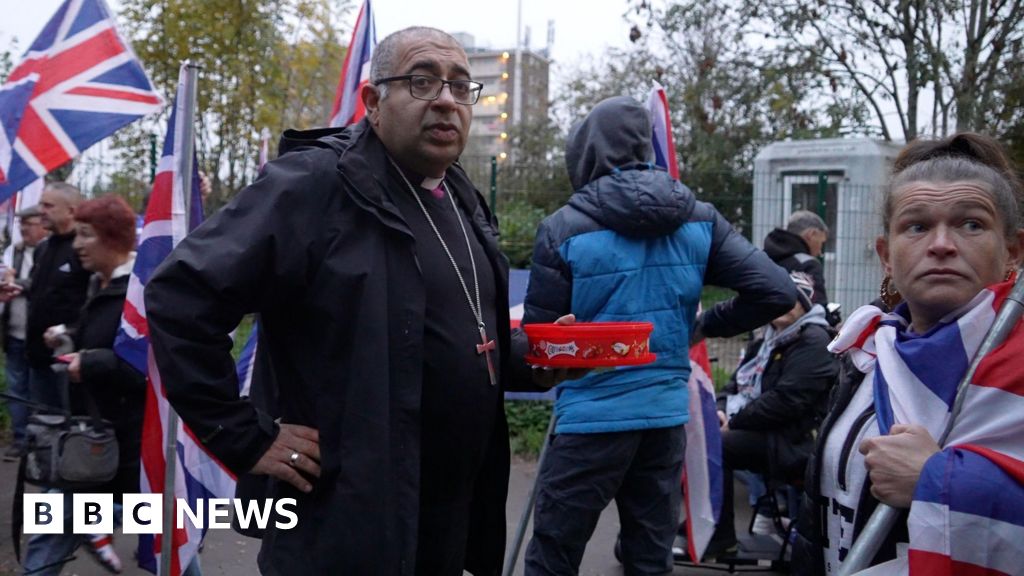Aleem Maqbool,Religion editor and
Catherine Wyatt
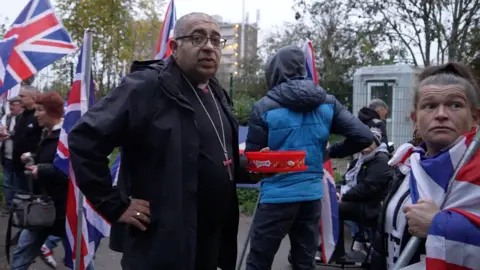 BBC
BBC
Bishop Arun Arora is addressing a dilemma in the Church of England over welcoming people on both sides of the immigration debate by seeking unity
Gareth Talbot does not necessarily believe in God, but he’s started going to church.
He felt compelled to do so after taking part in one of Tommy Robinson’s rallies in September.
“I never thought I had to choose before, but now I’m feeling like Christianity could be replaced, so that’s why I feel the church needs support,” the 36-year-old from Bradford says.
Gareth talks about the church in England being under “threat”, as he sees it, mainly from Islam. He says his concern is about the extreme elements of Islam, not the religion as a whole.
He also makes claims about all the Christmas markets in London being renamed “festive markets” and about some areas of the country becoming “fully Muslim”, as other reasons for feeling a need to engage more with Christianity.
Having now returned to the church he used to attend as a child with his grandmother in Little Horton, Bradford, Gareth says he wants to take more of an interest in what is going on there.
“It’s not that I’ve found God,” he says. “I’ve never felt you need to go to church to be a Christian, but it’s always been the Christian religion that’s kept our values and freedoms, and that’s why I need to support it now.”
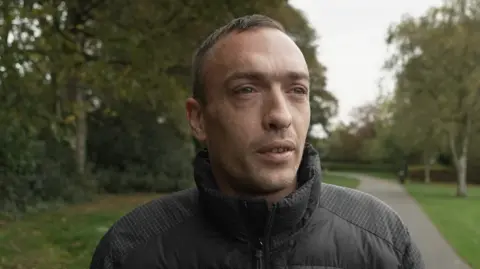
Gareth has returned to church in Bradford
He was among those attending September’s Unite the Kingdom rally, and was in plenty of company. Many of the protesters, estimated to number between 110,000 and 150,000, who marched in central London that day carried Christian symbols such as wooden crosses, and placards featuring Bible verses. Some were dressed as crusader soldiers.
That was a lot to do with the man who organised the event, Robinson – real name Stephen Yaxley-Lennon – the far-right figure who says he recently found Christian faith while in prison.
All this has left the Church of England, an institution steeped in national history and culture, but which has undergone decades of declining attendance at its services, grappling with fundamental questions.
How does it challenge what some see as misrepresentations of Christian values, while welcoming potential new churchgoers?
And how does it reconcile engaging those on one side of the debate like Gareth, with continuing its long-standing interfaith work to foster understanding between Christians, Muslims and people of other faiths and support asylum seekers?
When Gareth walked into the church in Little Horton, he met its vicar, the Reverend Derek Jones, who encapsulates the dilemma. Since then, Mr Jones has mainly been listening to Gareth and exploring what he means by British or Christian values.
“I’m grateful for the opportunity to understand where he’s coming from and what he thinks it means to promote the values that he associates with the Christian faith,” says Mr Jones.
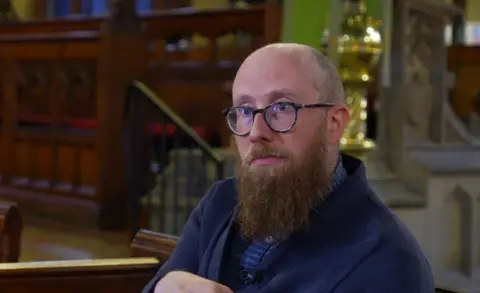
The Rev Derek Jones is taking time to listen to Gareth and his views
“There are times when I question whether some of these movements fully understand the gospel that they are seeming to walk behind, and my gut feeling is it’s more about identity than faith,” he adds.
It’s a “difficult road for the Church to walk,” he says.
This debate has left some prominent Christians feeling deeply uncomfortable. In September, a group of Church of England bishops joined leaders from other Christian denominations to condemn what they called the “co-opting of the cross” at Robinson’s rally as a means of causing division and “excluding others”.
While they acknowledged in an open letter that many of those at the rally felt a “deep sense of frustration at feeling unheard”, the bishops said the “cross was the ultimate sign of sacrifice for the other”, and that Jesus called on people to love their neighbours.
Their criticisms were echoed by former Archbishop of Canterbury Rowan Williams, who said people should see migrants as vulnerable people just like them.
Yet away from the mainstream, Ceirion Dewar, who is a bishop in the small, more conservative, traditionalist Confessing Anglican Church, insists he will not be “lectured to” by these clergy.
Having started Robinson’s rally by leading a prayer – a request he felt was his “Christian duty” to accept – he says he saw thousands there who sincerely felt that Great Britain was “founded on Christian principles and from the Christian faith” and that this was being “eroded”.
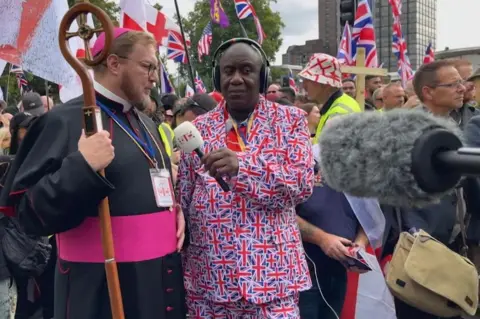
Bishop Ceirion Dewar (left) led a prayer at the United the Kingdom rally in September
He also spoke alongside Robinson at a previous rally in Trafalgar Square, telling the crowd the “nation was under attack” by Muslims, “woke ideology”, cancel culture and Labour MPs.
He says clergy should stop “judging people” and “get into the streets and listen to their concerns”.
Whichever perspective one brings, the emergence of Robinson and his supporters is clearly dividing Christians, and there is no easy answer for how the Church can approach it while remaining true to its deeply held value of tolerance.
In recent months, that tolerance and charity has been on display at a hotel housing migrants in West Yorkshire. There, members of local churches have expressed their Christianity by supporting asylum seekers.
But the migrants have also faced hostility and opposition to their presence, with weekly protests outside the hotel.
One of those staying there is Amir – not his real name – who four months ago came to the UK across the Channel on a small boat, having fled persecution in Iran. He has been baptised and has started going to church in Britain.
Last month he was beaten up close to the hotel, though the attackers and their motive is not known for certain.
“I hope it never happens to anyone else. I left my country because I did not feel secure, and now I do not feel secure here,” says Amir.
He has now been granted leave to remain in the UK and says the fact he and the other migrants in the hotel have received support from church-goers has “been so important for us”.
As evening falls outside the migrant hotel, anti-immigration protesters and counter-demonstrators gather. Weaving between the two sides is the Bishop of Kirkstall, the Right Reverend Arun Arora, who is handing out chocolates.
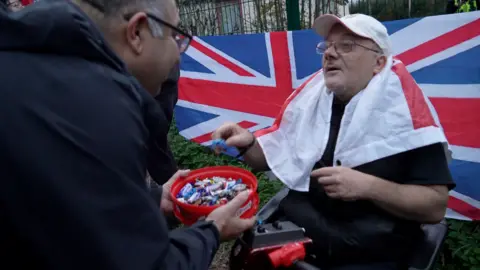
Bishop Arora says he believes in healthy disagreement
The bishop, who was hugged by the organiser of the anti-immigration protest, says part of his role is to show that “God doesn’t have favouritism” and to provide a neutral space for people to be heard.
“Part of the reason that the organiser and I know one another, is that I reached out to him on social media to meet and break bread together and to say ‘How can we disagree well? How can we share this city knowing that we are going to take radically different views on this issue?'” says Bishop Arora.
He also feels it’s important the Church calls out “injustice” and “hatred”, and criticises what he refers to as “a narrow Christian nationalist ideology” he says has been on display of late.
Some in the Unite the Kingdom movement seem comfortable, even proud, of being called “Christian nationalist” – while others feel it is a term meant to malign some who are simply defending what they interpret as “Christian values”.
Bishop Arora’s use of that term and talking of “hatred” might not sound neutral to some of the anti-immigration protesters outside the migrant hotel. On the other side, some might be uncomfortable with him hugging the organiser of protests that left people in the hotel feeling intimidated.
But his attempts to find common ground may be an approach others in the Church are quietly adopting, too.
In January, Church of England bishops from around the country will gather – with “national unity and diversity” one of the topics on the agenda. A political theologian and other experts have been invited to help discuss the issue, which is seen as one of the biggest it currently faces.
When she was appointed in October, the Archbishop of Canterbury-elect Sarah Mullally described a divided society, warning “people are frightened for lots of reasons, and often that then presents in ways that, for other people, may feel threatening”.
Clergy like Mr Jones have largely been left to their own devices so far when it comes to welcoming people like Gareth to the Church, while supporting those who feel threatened by the movement to which he belongs.
